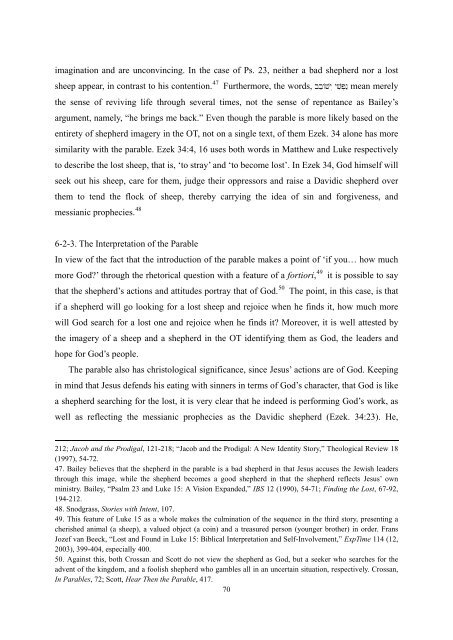the role of the lukan parables in terms of the purpose of luke's gospel
the role of the lukan parables in terms of the purpose of luke's gospel
the role of the lukan parables in terms of the purpose of luke's gospel
Create successful ePaper yourself
Turn your PDF publications into a flip-book with our unique Google optimized e-Paper software.
imag<strong>in</strong>ation and are unconv<strong>in</strong>c<strong>in</strong>g. In <strong>the</strong> case <strong>of</strong> Ps. 23, nei<strong>the</strong>r a bad shepherd nor a lost<br />
sheep appear, <strong>in</strong> contrast to his contention. 47 Fur<strong>the</strong>rmore, <strong>the</strong> words, mean merely<br />
<strong>the</strong> sense <strong>of</strong> reviv<strong>in</strong>g life through several times, not <strong>the</strong> sense <strong>of</strong> repentance as Bailey’s<br />
argument, namely, “he br<strong>in</strong>gs me back.” Even though <strong>the</strong> parable is more likely based on <strong>the</strong><br />
entirety <strong>of</strong> shepherd imagery <strong>in</strong> <strong>the</strong> OT, not on a s<strong>in</strong>gle text, <strong>of</strong> <strong>the</strong>m Ezek. 34 alone has more<br />
similarity with <strong>the</strong> parable. Ezek 34:4, 16 uses both words <strong>in</strong> Mat<strong>the</strong>w and Luke respectively<br />
to describe <strong>the</strong> lost sheep, that is, ‘to stray’ and ‘to become lost’. In Ezek 34, God himself will<br />
seek out his sheep, care for <strong>the</strong>m, judge <strong>the</strong>ir oppressors and raise a Davidic shepherd over<br />
<strong>the</strong>m to tend <strong>the</strong> flock <strong>of</strong> sheep, <strong>the</strong>reby carry<strong>in</strong>g <strong>the</strong> idea <strong>of</strong> s<strong>in</strong> and forgiveness, and<br />
messianic prophecies. 48<br />
6-2-3. The Interpretation <strong>of</strong> <strong>the</strong> Parable<br />
In view <strong>of</strong> <strong>the</strong> fact that <strong>the</strong> <strong>in</strong>troduction <strong>of</strong> <strong>the</strong> parable makes a po<strong>in</strong>t <strong>of</strong> ‘if you… how much<br />
49<br />
more God?’ through <strong>the</strong> rhetorical question with a feature <strong>of</strong> a fortiori, it is possible to say<br />
that <strong>the</strong> shepherd’s actions and attitudes portray that <strong>of</strong> God. 50<br />
The po<strong>in</strong>t, <strong>in</strong> this case, is that<br />
if a shepherd will go look<strong>in</strong>g for a lost sheep and rejoice when he f<strong>in</strong>ds it, how much more<br />
will God search for a lost one and rejoice when he f<strong>in</strong>ds it? Moreover, it is well attested by<br />
<strong>the</strong> imagery <strong>of</strong> a sheep and a shepherd <strong>in</strong> <strong>the</strong> OT identify<strong>in</strong>g <strong>the</strong>m as God, <strong>the</strong> leaders and<br />
hope for God’s people.<br />
The parable also has christological significance, s<strong>in</strong>ce Jesus’ actions are <strong>of</strong> God. Keep<strong>in</strong>g<br />
<strong>in</strong> m<strong>in</strong>d that Jesus defends his eat<strong>in</strong>g with s<strong>in</strong>ners <strong>in</strong> <strong>terms</strong> <strong>of</strong> God’s character, that God is like<br />
a shepherd search<strong>in</strong>g for <strong>the</strong> lost, it is very clear that he <strong>in</strong>deed is perform<strong>in</strong>g God’s work, as<br />
well as reflect<strong>in</strong>g <strong>the</strong> messianic prophecies as <strong>the</strong> Davidic shepherd (Ezek. 34:23). He,<br />
212; Jacob and <strong>the</strong> Prodigal, 121-218; “Jacob and <strong>the</strong> Prodigal: A New Identity Story,” Theological Review 18<br />
(1997), 54-72.<br />
47. Bailey believes that <strong>the</strong> shepherd <strong>in</strong> <strong>the</strong> parable is a bad shepherd <strong>in</strong> that Jesus accuses <strong>the</strong> Jewish leaders<br />
through this image, while <strong>the</strong> shepherd becomes a good shepherd <strong>in</strong> that <strong>the</strong> shepherd reflects Jesus’ own<br />
m<strong>in</strong>istry. Bailey, “Psalm 23 and Luke 15: A Vision Expanded,” IBS 12 (1990), 54-71; F<strong>in</strong>d<strong>in</strong>g <strong>the</strong> Lost, 67-92,<br />
194-212.<br />
48. Snodgrass, Stories with Intent, 107.<br />
49. This feature <strong>of</strong> Luke 15 as a whole makes <strong>the</strong> culm<strong>in</strong>ation <strong>of</strong> <strong>the</strong> sequence <strong>in</strong> <strong>the</strong> third story, present<strong>in</strong>g a<br />
cherished animal (a sheep), a valued object (a co<strong>in</strong>) and a treasured person (younger bro<strong>the</strong>r) <strong>in</strong> order. Frans<br />
Jozef van Beeck, “Lost and Found <strong>in</strong> Luke 15: Biblical Interpretation and Self-Involvement,” ExpTime 114 (12,<br />
2003), 399-404, especially 400.<br />
50. Aga<strong>in</strong>st this, both Crossan and Scott do not view <strong>the</strong> shepherd as God, but a seeker who searches for <strong>the</strong><br />
advent <strong>of</strong> <strong>the</strong> k<strong>in</strong>gdom, and a foolish shepherd who gambles all <strong>in</strong> an uncerta<strong>in</strong> situation, respectively. Crossan,<br />
In Parables, 72; Scott, Hear Then <strong>the</strong> Parable, 417.<br />
70
















